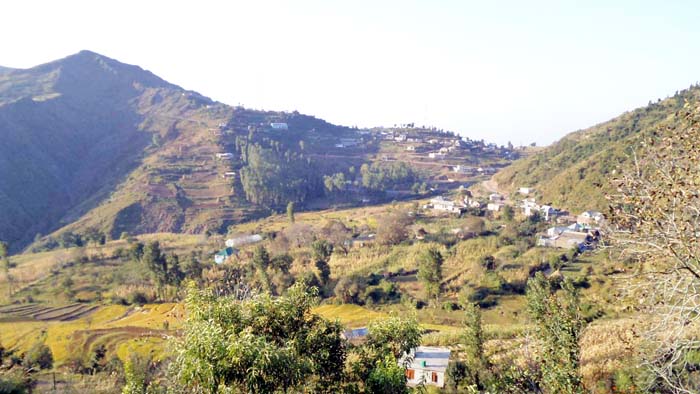Dr Narinder Paul
Machhedi is situated at a distance of 35 Km from Billawar town of District Kathua. Surrounded by magnificent mountainous ranges, it reminds one of the distinguished picnic resorts of Kashmir. It experiences temperate climate all round the year. Much pleasant summers and extremely cold winters are the prominent features of the place. The proudly standing pines and deodars accompanied by walnut and pear trees and rich flora further increase the charmness of the place. The intrinsic tourism potential of this beautiful place of Kathua has not been explored yet. The poor connectivity of this place with the tehsil headquarters in general and rest of the state in particular however speaks of the apathetic attitude of those the helm of affairs and negligence of the developmental agencies towards it.
Geographically village Machhedi is situated at latitude 32.71 and longitude 75.61and at an elevation of 5000 feet from the mean sea level. The climate of the place remains cool with the pleasurable breeze of air usually flows across the mountain ranges. It receives lavish rains and is surrounded by plenty of naturally flowing water bodies which provides profuse water for the villagers and the animals and for the development of agriculture in the area. During winter it experiences light to moderate snowfall. Thus it receives sufficient precipitation. During the months of July and August, it experiences dense fog accompanied by continuous drizzle which makes the weather quite charming.
Agriculture is primarily the major vocation of the people and is of subsistence type rather than commercial. Non-commercial and non-machanized farming is practiced by the farmers. Natural streams which flows downwards provide irrigation to most of the fields. During kharif season, maize is the principal crop grown along with pulses and vegetables on a limited scale. However paddy is also grown in the low lying areas for which the source of water is these numerous naturally flowing streams. During Rabi wheat, mustard and peas are taken up. Majority of the wheat grown is fed green to the cattle and very limited is grown for grain purpose. The green and yellow stripes of the wheat and mustard crops respectively on the hills gives bridal look to the area. Livestock rearing for family subsistence and backyard poultry keeping is also a routine practice with almost every household. Important fruit species commonly found in the area include walnut, pear, peach, plum, etc.
People are very hard working and live very simple life. The houses are scattered at top hills and in clusters at the foothill. Majority of the houses in the village are kaccha made from using locally available material i.e. clay, stones, wood etc. However, few houses are pacca or made up of cement, stone and galvanized tin sheets. Few shops which cater to the needs of the people are also available in the village.
Almost negligible infrastructure facilities are available in the village. Apart from a government managed guest house there is hardly any other appropriate accommodation for the outsiders\tourists. People have the facility of school, medical care, bank etc with in the village besides cantonment of army and police chowki and a community hall constructed and maintained by the army. All the roads, lanes and sublanes in the entire villages and adjoining area are either kaccha which remain filled with mud and turn slippery during rains or rough stones poorly pitched which reflects the degree of developmental works carried out in the area.
As regards transportation facilities, few old fashioned and obsolete buses ply between Machhedi and Billawar. Other stops enroute are
Sukral, Tackound, Dhull, Ghatt, Badola, Nan-Ghalla etc. undoubtedly there is a great tourism potential in the area. The magnificent look of the village attracts the nature loving people to come close and explore what they like.
An attractive spot near Machhedi is “Kurkan” located at an higher elevation which is a charming spot characterized by dense clusters of tall deodar (Cedrus deodara) trees. At this point one feels himself in the lap of nature. But the entire tale of woes is the degree of apathy towards this natural scenic spot which has missed it from the tourist map of the state in general and district in particular. What is needed is to bring this beautiful place on the tourist map of the state to explore the hidden potential of this place. (The author is Agriculture Extension Officer)
Trending Now
E-Paper


